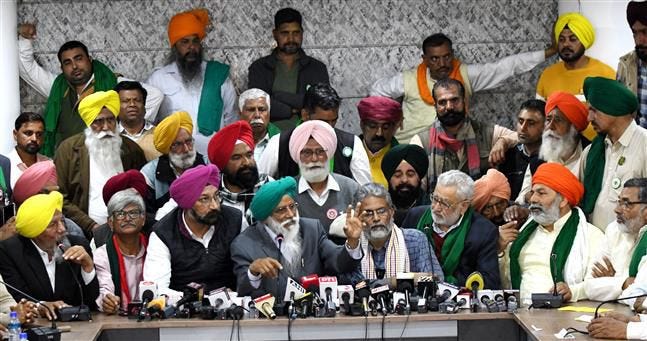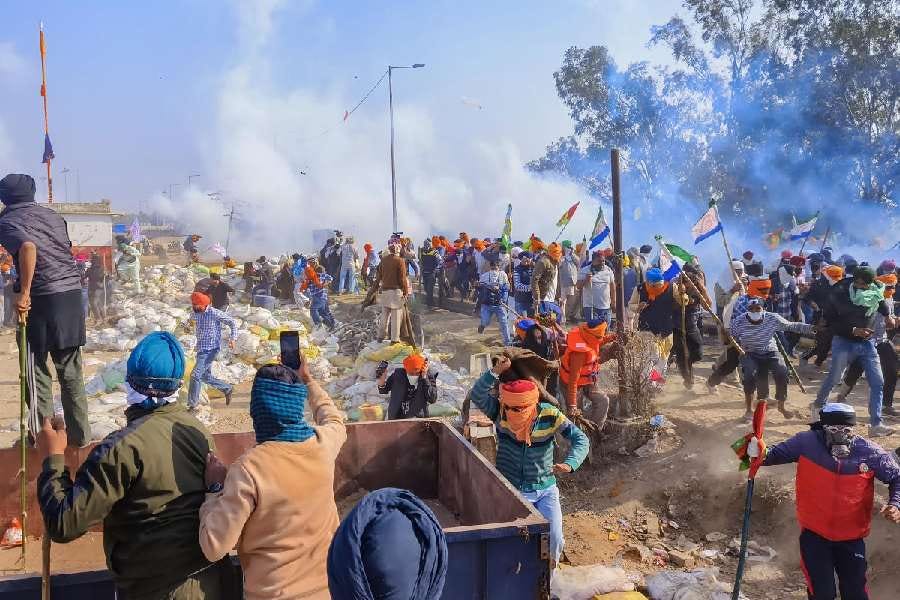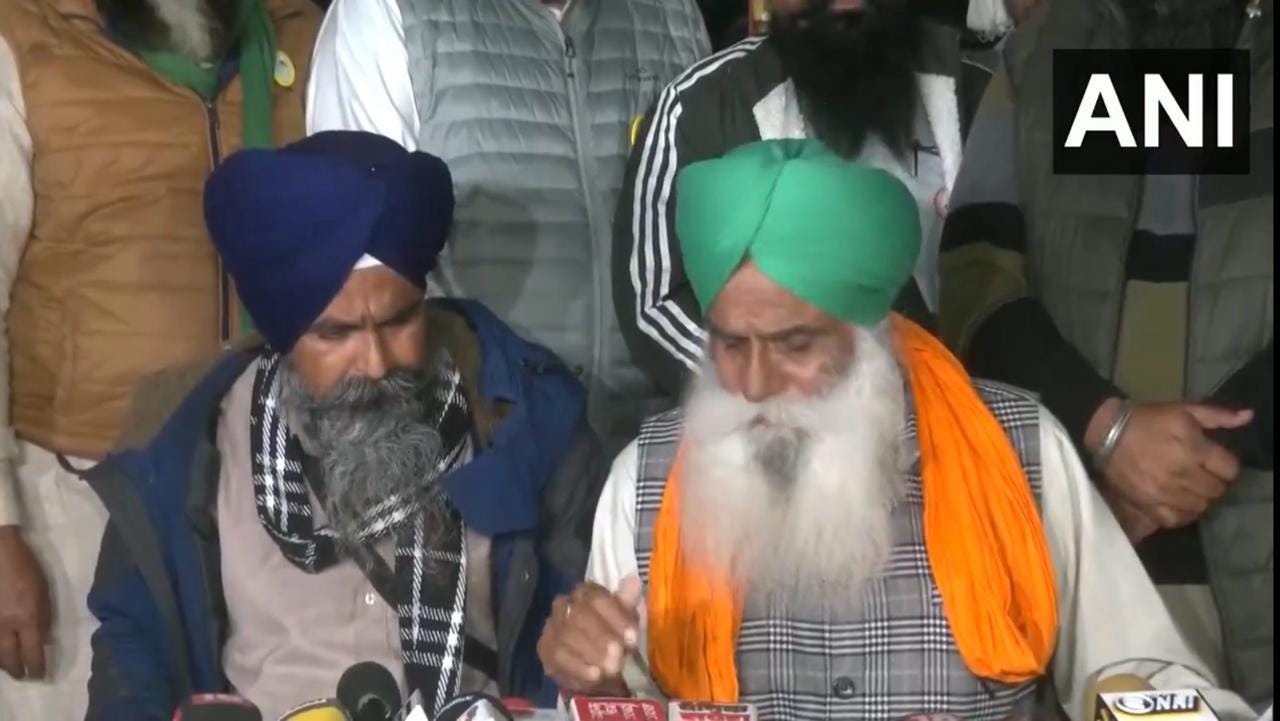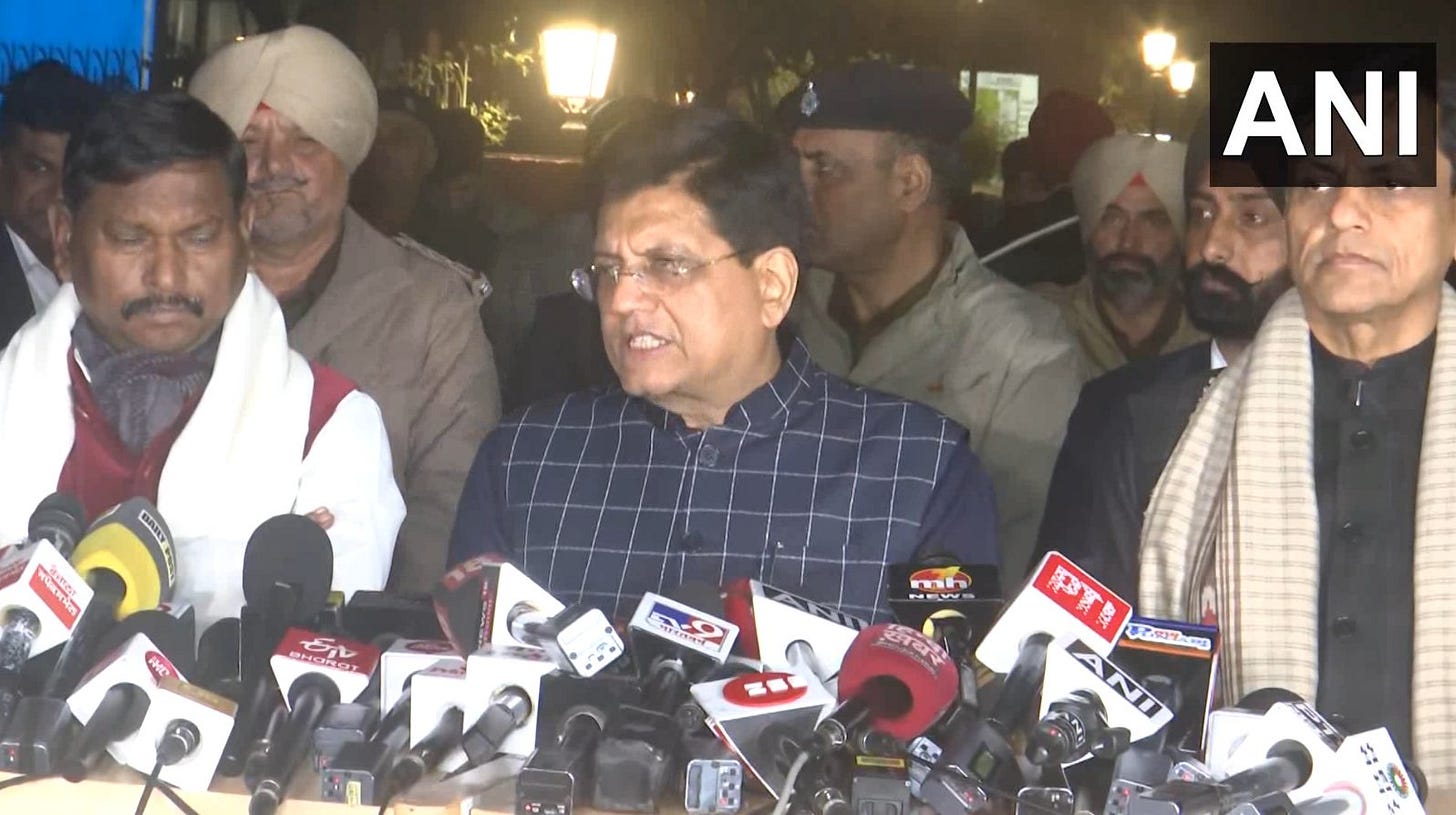Tragic Escalation at Khanauri
The tragic incident yesterday (February 21) involving the death of 21-year-old Shubh Karan Singh at Khanauri, near the Punjab-Haryana border, due to a head injury from a bullet allegedly fired by the Haryana Police, has intensified the Farmers' Agitation in Punjab. Despite four rounds of discussions between Union Ministers and farmers' representatives in Chandigarh, which took place in a relatively amicable atmosphere, the farmers had unanimously rejected the latest proposal from the Center. They deemed it insufficient, maintaining their unwavering demand for a statutory Minimum Support Price (MSP) for all the 23 crops.
Strategic Pause in the March to Delhi
After reaching a deadlock in negotiations with the Centre, the farmers' organisations, led by SKM (Non-Political) leader Jagjit Singh Dallewal and Kisan Mazdoor Sangharsh Committee General Secretary Sarwan Singh Pandher, initially planned a march to Delhi (Dilli Chalo) on 21st February. This plan, however, was put on hold for 48 hours by the farmers in a sensible decision following the unfortunate Khanauri incident. In contrast, other stakeholders, seemingly eager to capitalize on the unrest, quickly engaged in the situation.
Reactions of the Congress Party
The Congress Party, being the principal opposition in Punjab, where the AAP is currently in power, and also at the national level, swiftly criticized both the BJP and AAP in the wake of the incident. It urged the Prime Minister to fulfill his promise of instituting a statutory minimum support price (MSP) for farmers, a pledge made earlier. Concurrently, Congress leaders called upon to the AAP leaders in Punjab Government to honour their pre-2022 Vidhan Sabha election commitments and provide MSP for the farmers, highlighting the need for political accountability and action.
Akali Dal's Stand Amidst Farmer Protests
The Shiromani Akali Dal (SAD), having parted ways with the BJP-led NDA and remaining out of power in Punjab since 2017, seized the opportunity to criticize both the BJP and AAP. It accused them of failing to fulfill their promises, while also condemning the Congress for ignoring the Swaminathan Commission's recommendation to link MSP with a 50% margin over the cost of cultivation. SAD, through its General Secretary Bikram Singh Majithia, and the SGPC, echoed and supported the farmers' demands and criticized the Central Government's dilatory response, emphasizing the need for just treatment of Punjabi farmers.
Central Government's Response to Agitation
The Central Government and BJP's national representatives presented a unified and a coherent response to the farmers' protests. They highlighted that four rounds of discussions had already taken place with the farmers' organisations, with an invitation since extended for a fifth. Despite the rejection of a proposed mini-package after the fourth round, they emphasized Prime Minister Narendra Modi's commitment to promptly address the farmers' concerns. This includes various schemes and direct benefit transfers initiated since 2014, alongside a recent increase in sugarcane MRP, urging for peaceful dialogue to resolve the various issues.
Punjab BJP's Call for Peace
The Punjab BJP, navigating a nuanced stance, voiced its sorrow over the young farmer's death through leaders like Punjab BJP President Sunil Jakhar and Captain Amarinder Singh, the former Chief Minister now with BJP. They urged for peace and cautioned against succumbing to what they termed as the political propaganda of parties that have historically offered little beyond lip service to farmers' welfare. They emphasized that the legitimate demands of farmers, both in Punjab and nationwide, would be attentively heard and addressed, advocating for a peaceful approach to resolution.
Punjab Government's Strategic Approach
The Punjab Government, under Chief Minister Bhagwant Mann, adeptly managed both political and administrative challenges. It actively facilitated mediation in discussions between farmers and the Central Government, while ensuring the Punjab Police refrained from any excessive use of force, even as it received an advisory from the Union Ministry of Home Affairs to maintain law and order. Amidst calls for restraint from both Punjab and Haryana officials, Mann committed to legally prosecuting the individual responsible for Shubh Karan Singh's death. However, at the time of writing, no FIR naming the prime suspect had been filed, in respect of the tragic incident that occurred at Khanauri in Punjab.

The Original SKM and its Strategic Planning
Following the widespread dissent sparked by the recent unfortunate incident, core farmers' organisations under the Samyukta Kisan Morcha (SKM) banner, including the BKU factions of Rajewal, Ugrahan, and Lagowal, held a press conference in Chandigarh today (February 22). While they had previously shown only symbolic support from the sidelines of the negotiations led by the Pandher and Dallewal splinter groups, they now made a concerted attempt to come back into the limelight and called for a judicial inquiry into the Khanauri shooting and death. Furthermore, they announced plans for a major farmers' gathering at the Red Fort, New Delhi, on 14th March, highlighting the national unity behind the MSP demands, under the SKM pennant. This move aims to amplify pressure on the Central Government ahead of the forthcoming Lok Sabha elections, despite potential challenges from the impending promulgation of the election code of conduct.
Social Media Discourse—Condemning anti-Sikh comments
Recent trends on social media, notably Twitter, sporadically mislabeling Punjabi farmers as Khalistan supporters, coupled with derogatory remarks by a political figure in West Bengal against a turbaned Sikh IPS officer, underscore the need for restraint and sensitivity in public discourse. We condemn such abuse unequivocally, irrespective from where it emanates. The 21st February Delhi march, coinciding incidentally with the centenary of "Jaito Da Morcha" and the unparalleled sacrifices of Sikhs under British fire in 1923, served as a potent reminder of the Sikh community's deep-rooted patriotism. Branding them broadly as Khalistanis is not only harmful but also legally reprehensible, highlighting the importance of respecting and understanding not only historical and national sentiments but also religious and regional sensitivities.
Navigating the Path to Resolution
The journey towards a resolution through negotiation is complex and challenging, yet not insurmountable. Success hinges on the stakeholders' ability to engage in discussions with sincerity, openness to compromise, and a willingness to find common ground. Misunderstandings and duplicity can derail these efforts, emphasizing the need for transparency and trust. Ironically, while political entities profess to champion farmers' interests, actions often diverge from words. Thus, it falls upon the Punjabi farmers to approach negotiations pragmatically, discerning genuine offers from elusive ideals, with peace as the paramount goal.
As they say, a bird in hand is worth two in the bush.






A very balanced and an unbiased write up. Complete rejection by farmers is not fair and right approach . During Four rounds there must have been some issues that both had meeting of the mind . Whatever was acceptable should be put it settled box . In the long run the focus from resolution of the issues to posturing and proving strength . Incident in Khanauri is very unfortunate & serving as fuel to the fire. If strict discipline is not maintained by all , there could be more similar incidents.
The environment is now polluted with suspicion on both sides. Like you said it is. difficult but not insurmountable.
We wish and hope for a peaceful and fair resolution.